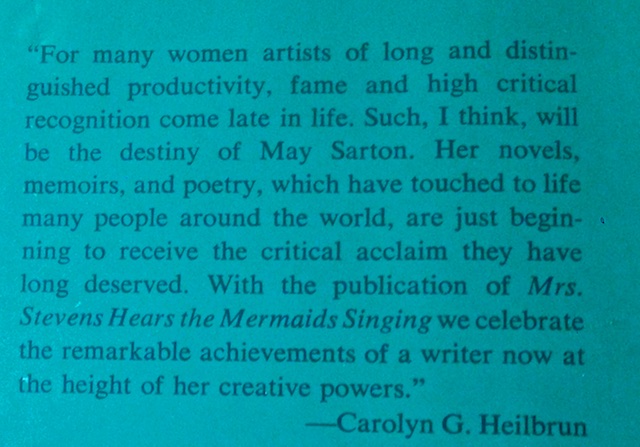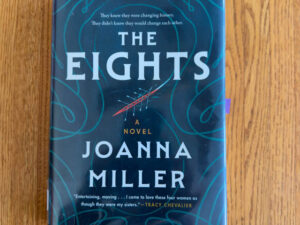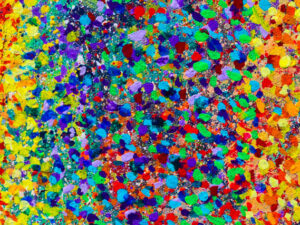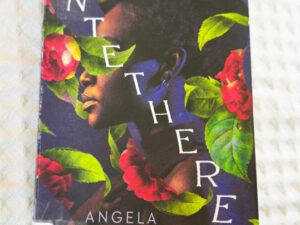
–
One of the features of one of the libraries I frequent is there is a “staff recommends” table. I always browse it. There are usually newer, popular books there, so when an older one shows up, I take particular notice, since someone had to venture off the path and really like one, to put it there when it is no longer part of the current conversation. This book I found there and I was drawn to it; I immediately picked it up because I had previously read and loved this author’s Journal of a Solitude, giving it five stars.
This book is billed as a novel, but it is a record of a fictitious woman poet in her 70’s (that you assume is basically May Sarton herself) being interviewed, including all her mind’s meanderings and flashbacks. Written in 1965, it is basically of the struggle of being a woman artist, and uncharacteristically for the time, it also briefly discusses bi-sexuality and homosexuality.
Fortunately, I think being a woman artist is easier now, although still not equal to being male in many important ways. I remember my mother as a female artist in the 60’s dealing with some of these same issues as discussed in this book. We have made much progress, but more still needs to be made.
What was most interesting to me here was the discussion of the process of writing poetry, and realizing her sense of The Muse and mine are vastly different. At one point I wouldn’t have said I had one, and now I know it is God; for her the The Muse (which she also calls the mirage and the echo) are people or places.
But I share not only poetry with this woman, but the desire to be understood coming from roots of not being heard, together with a passionate intensity that is often too much for some people. It made us feel somewhat like kindred spirits, and that held my attention.
I loved the writing too, which comes from a very perceptive place and is much different than what I usually read. It was plotless and dated, and while meandering and undemanding, it was also thoughtful and refreshing.
Here are the bits I loved:
- “It was all very well to insist that art was art and had no sex, but the fact was that the days of men were not in the same way fragmented, atomized by indefinite small tasks.”
- “Poetry has a way of teaching one what one needs to know… if one is honest.”
- “What I wanted and never got from them was recognition.”
- “You can’t break the mould and also be consoled for breaking it!”
- “She felt enlarged by goodness, not an emotion she was used to feeling at all…”
- “Learn to solve the equations through art.”
- “The work of art comes from what is not lived out?”
- “…the fundamental point is the diffusion of sensuality.”
- “Poems are epiphanies, a moment or a time of personal revelation.”
- “Might the definition of rest be just this, the being understood?”
- “You have learned what you need to know in order to say what you have to say.”
- “I find it mildly intoxicating after all these years, to be listened to.”
- “I ceased a long time ago to pay the slightest attention to what might be said about me.”
- “People who cannot feel punish those who do.”
- “Odd that there has been no great religious woman poet…”
- “Intensity commands form.”
- “But there is no doubt that I have always regarded myself as an instrument.”
- “It is yourself who must be conquered.”
- “The person who has created something is always vulnerable.”
- “Under all the superficial praise of the ‘creative’ is the desire to kill.”
- “Woman’s work is always toward wholeness.”
- “There’s no standing still. Life at best is terrifying, don’t you agree? One either keeps on growing and changing, or one begins to fossilize, take your choice.”
- “Women have moved and shaken me, but I have been nourished by men.”
- “Some English divine once remarked that it was a mistake to suppose that God is chiefly concerned with religion.”
- “She gathered their delighted smiles and pounced…”
- “Loneliness is poverty of self; solitude is the richness of self.”
- “The Muse is always a question–that’s what sets up the dialogue.”
- “For the aberrant woman art is health, the only health. It is always integrating… that’s the whole point.”
- “The woman who needs to create works of art is born with a kind of psychic tension in her that drives her unmercifully to find a way to balance, to make herself whole. Every human has this need: in the artist it is mandatory.”
- “They have to write from the whole of themselves, so the feminine genius is the genius of self-creation.”
- “True feeling justifies, whatever it may cost.”
- “You will find that whatever is not material for poetry is not material for life.”
- “It’s all grist for your mill. Even Hell gets to be useful.”
- “I think I would have liked to be a woman, simple and fruitful, a woman with many children, a great husband… and no talent.”
- “Every ending is a beginning.”
I enjoyed this and give it four stars. A blast from the past, antiquated in ways, it is thoughtfully still relevant. It is always good to read someone who has courage enough to be authentic.
–

1 Comment
Pingbacks
-
[…] An old book: The Man in the Iron Mask by Alexandre Dumas (my 4 star review here), Mrs. Stevens Hears the Mermaids Singing by May Sarton (my 4 star review here) […]






